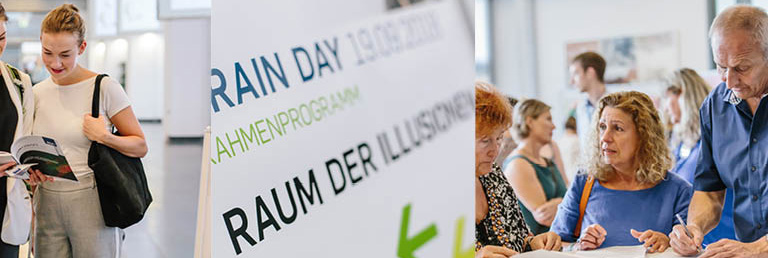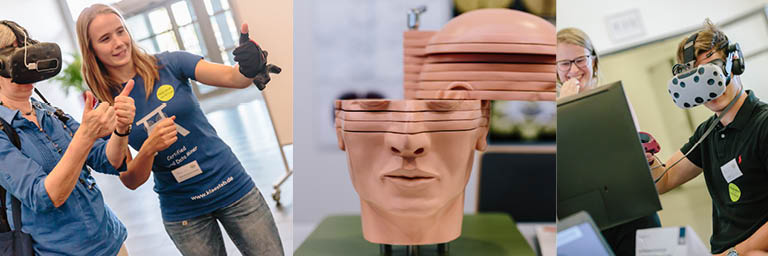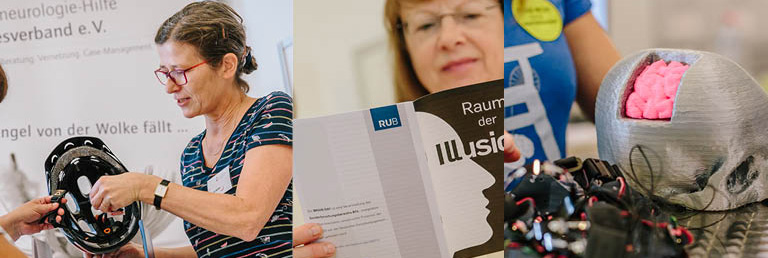BRAIN DAY 2019 – Programme

FROM FUNDAMENTAL RESEARCH TO THERAPY
A day with a focus on Bochum’s neuroscience with lectures, information stands and activities.
25.09.2019, 1pm to 5pm, RUB Conference Center
PROGRAMME
| 13:00 | BEGINNING OF THE SUPPORTING PROGRAMME Presentations of support groups Activities to join in |
| 13:30 | WELCOME AND OPENING PD Dr. Dirk Jancke, Vice-Speaker SFB 874, Ruhr-Universität Bochum |
| 13:45 | MOUNTAIN AIR – How the brain reacts to oxygen deficiency Prof. Dr. med. Petra Platen, Dean of the Faculty of Sports Science, Chair of Sports Medicine and Sports Nutrition, Ruhr-Universität Bochum |
| Read more When we ski or hike in the mountains or climb high mountains, we move in thin, low-oxygen mountain air. The higher we get the thinner the air and the lower the oxygen content gets. For example, at the summit of Mont Blanc, the highest mountain of the Alps at 4810 m, the oxygen content is only about half (11 percent instead of 21 percent) of the salinity at sea level or here in Bochum. On the summit of Mount Everest, the oxygen content is then only about a third. Since many people move or work in the mountains or work in special halls under reduced-oxygen atmosphere at sea level, we in sports medicine are interested in the reactions of the body and in particular in the reaction of the brain under oxygen deficiency. Since all the cells of the body rely on oxygen for their metabolism and their functioning, the entire body becomes stressed when there is a lack of oxygen. Emergency programs are triggered. However, these emergency programs are no longer sufficient when moving at high altitudes to fully meet the oxygen demand of the cells and especially the brain. It comes to performance losses. With such performance losses, we are engaged in the department of sports medicine and sports nutrition at RUB, because they go u. a. with an increased accident and injury risk or even with the risk of death. The presentation will address different aspects of performance degradation in hypoxic situations (mountain walking at different altitudes, staying in high altitude training rooms of the department, or breathing oxygen depleted air), such as attention parameters, dynamic and sharpness vision, or motor control of finger movements. | |
| 14:14 | INNOVATIVE GENE THERAPY- A hope for patients with rare diseases? Prof. Dr. med. Matthias Vorgerd, Neurological University Clinic and Polyclinic, Berufsgenossenschaftliches Universitätsklinikum Bergmannsheil GmbH |
| Read more Rare diseases occur in many different forms and are often caused by inherited genetic defects. In many cases, only the symptoms can be treated, but not the underlying cause of the rare disease. In recent years, however, gene or enzyme replacement therapy has been approved for some of these diseases, allowing treatment of the cause of the disease. The presentation will discuss some neuromuscular diseases for which this new form of treatment is already available. These are amongst others Pompe disease (with a metabolic defect in lysosomal glycogen turnover), spinal muscular atrophy, and Duchenne muscular dystrophy. These diseases can now be effectively treated. The talk will focus on the clinical pictures of these rare diseases and the latest treatment options. It presents cost / benefit aspects, pros and cons of these treatments and a look ahead for other gene therapy approaches. | |
| 14:45 | COFFEE BREAK + SUPPORTING PROGRAMME |
| 16:00 | NAVIGATION SYSTEM IN THE HEAD – How do brains move in space? Prof. Dr. Sen Cheng, Institute of Neuroinformatics, Computational Neuroscience, Ruhr-Universität Bochum |
| Read more Whether looking for food, nesting material or a companion, most animals can orient themselves well in their environment. Studies in animals and humans show that the neuronal mechanisms behind this spatial navigation are highly complex. The discovery of important factors in orientation – the so-called place cells and grid cells cells in the brain – was awarded in 2014 with the Nobel Prize. Yet we know very little about how the brain recognizes where we are, retrieves where we want to go, and calculates which way is the most efficient to the destination. In my research, I use computer models to examine how the brain solves these problems. I also try to develop artificial systems that orientate themselves just as autonomous, robust and flexible as we can. | |
| 16:30 | DEVELOPMENT NEUROLOGY IN PREMATURE BABYS AND SELECTED ASPECTS OF NUTRITION AND COGNITION IN CHILDREN Univ. Dr. med. Thomas Lücke, Director of the University Clinic for Children and Youth Medicine, St. Josef Hospital / Catholic Clinic Bochum |
| Read more The emergence, the gestation of a tiny human in the womb and its development after birth, has, despite great advances in developmental neurology, still something magical. Significant development milestones are highlighted and research results presented. How do premature babies with birth weights under 1500 g develop compared to term-born children? What about the Theory of Mind – the ability to empathize with other people’s minds – from premature babies compared to mature born babies? Does nutrition in older children affect cognition? |
SUPPORTING PROGRAMME

The neuroscientists from the Ruhr-Universität Bochum have come up with an exciting new programme and we would like to invite you to join us, test your brain cells and chat with our researchers.
Trembling, sweating, stress hormones and a lot more our body has in stock to work optimally in stressful situations. The researchers of the Department of Cognitive Psychology will tell you everything about the stress response and show you ways to measure it. Find out how stress is triggered in the lab and experience what it feels like.
Let a hypnotist put you in a trance and learn from the scientists at the LWL University Hospital and the University Hospital Bergmannsheil how to change the sense of touch through hypnosis. Together, they are studying with philosophers, psychologists and neuroscientists of the RUB, whether hypnosis can influence the perceptions in the brain.
The Faculty of Sports Science presents a “Sensomotoric Coordination” hands-on course: test your ability to react, your hand strength and muscle activity, or your balance ability. Or try exercises to improve coordination, such as the Balance Trainer, the Coordinator, or a “circus-ready” Juggling. Learn how sports science examines motor coordination.
Where are hippocampus, cerebellum, or pituitary gland? Members of the Institute of Anatomy, Department of Cytology, will help you get oriented in the brain. Discover the most astonishing human organ under the microscope, through exhibits, and diagrams.
Digital speech training – Learn from the staff of the Cognitive Signal Processing Working Group at the RUB and the faculty of logopedics at the hsg Bochum, how acoustic and visual speech recognition creates a “speech therapy assistant”. This supports with playful exercises, the home training for children with pronunciation errors and thus complements the logopedic therapy.
What is intelligence and how do you measure it? Why are some people smarter than others? Employees of the AE Biopsychology use state-of-the-art methods to get to the bottom of these questions. Learn more about the neural foundations of human intelligence, gain an impression in imaging methods, and try solving intelligence testing tasks!
INFORMATION STANDS OF THE SUPPORT GROUPS

Alzheimer Gesellschaft Bochum e.V./
Demenz-Servicezentrum Ruhr
Epilepsie-Selbsthilfegruppe Essen
Deutsche Guillain-Barré Syndrom Initiative e.V.
Kinderneurologie-Hilfe Münster e.V.
Deutsche Multiple Sklerose Gesellschaft,
Ortsvereinigung Bochum und Umgebung e.V.
Deutsche Myasthenie Gesellschaft e.V.
Selbsthilfe-Kontaktstelle Bochum
Clusterkopfschmerz-Selbsthilfe-Gruppe, CSG Landesverband NRW e.V.
Inquiered among others:
Deutsche Gesellschaft für Muskelkranke e.V.
REGISTRATION
Participation is free of charge
Please confirm your attendance via
Sfb874-pr@rub.de
Or Phone: 0234 32-26675
DIRECTION
Public Transport subway U35 exit “Ruhr-Universität Bochum”, enter through Mensa (university cafeteria)
Download detailed directions here. (in German)
Car: via Universitätsstraße, Parking Deck P9, then follow signposts
Download Map Directions here.
